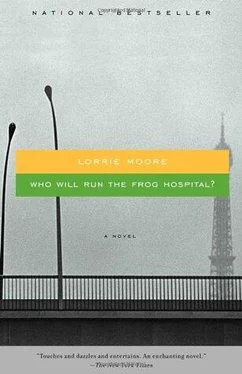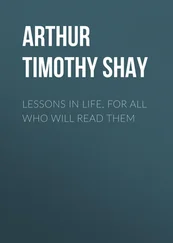I sat out there by myself that day, writing Sils a note. Hey, bébé , it began, in the same imbecilic way as all the others. What you say we meet for a smokin’ good time tonight?
“Is this an entrance to the amusement park?” asked a middle-aged couple with a young boy.
They read the prices on the board outside. “He’s only two,” said the woman, pointing at the boy. “And he’s only what, eleven?” She pointed to her husband.
“You’re only two?” I studied the boy, who was at least eight.
He shrugged. “I guess.”
“All right,” I said.
“And how about me ?” asked the man. He was wearing white shoes, a white golf shirt, and sky-blue pants. His neck and arms were sunburned and corded with veins. “I’m only two, too.”
“Mentally he’s only two,” said his wife.
Once you had seen enough people go through your register you realized everyone was the same: they looked the same, said the same things; they were all the same.
All the same , I scribbled large on my current ticket-tape note to Sils, right in front of them; full of the stupidities that obviously keep their marriage going . I wrote in a careful, loopy script, waiting as they tried to figure out how old they were.
I looked out through my window at the boy. “If you’re not as tall as that sign and at least nine years old,” I said, “you won’t be able to go on the rides alone. It has to do with the park’s insurance policy.” No doubt he’d be back for a “grow-up,” a system Herb had devised to let kids come back to the cashier and pay the difference in admission so they could ride the rides alone. “We’ve got a grow-up here,” he liked to say, ushering some boy to the register. “We’ve got a boy here who suddenly, magically grew up.”
There was money in grow-ups. When no one was looking, you just wrote “grow-up” on a stub, stuck it in the register, and took out the price of a child’s ticket.
“I know,” said this boy now, looking unhappy and trapped.
“Two adults and an under-six,” the couple said to me.
“That’s twenty dollars forty cents,” I said, not pressing any numbers, just pressing No Sale and letting the drawer pop out with a brrinnng .
“How much?” the man asked. He kept looking past the Plexiglas window, trying to get a view of the register total. But the numbers only said “0.00.”
“Twenty dollars forty cents,” I repeated. He gave me the exact change, which I temporarily placed in the register, shutting the drawer. Later, I would take it out.
“There you go,” I said, handing them three ticket stubs. “Keep your tickets for the rides.”
They frowned and waved and pushed their way through the turnstile, then turned the corner into the park and disappeared.
I waited a while before I rang the drawer open to take out the money. I waited to see if I heard anyone, someone just inside the entrance, someone crouching in a bush, someone lurking behind the cashier’s booth, perhaps, where I couldn’t see: someone with a walkie-talkie, or maybe just Stan the security guard on a cigarette break. But there seemed to be nobody, nothing, just the usual distant happy cries of kids, and so I rang the drawer open and then when I looked up over the register I saw Isabelle out of nowhere in her angry clicking spike heels, rounding the corner by the Baa-Baa Black Sheep Petting Pen and walking briskly toward the entrance. She was followed by Herb, who looked red-faced and vexed, and a policeman looking bored but stern — in a professional way. Isabelle pushed through the exit turnstile and knocked on my glass with her knuckles.
“OK,” she said, “close up this register. We’re shutting down this entrance.” Then she came to the side of my booth, unlocked the door, and pulled it open. With a sweep of her arm, she ushered me out. I pushed the register drawer shut and did as I was told. My chest was pounding. I was in trouble. That family , I thought. They were spies, plants, part of some in-house detective scheme . The nausea of all the rides — the spinning teacups, the whirling Black Widow — entered me, and I turned momentarily away in a sweat. My heart beat in a loud panic, and I struggled to breathe normally.
“We’ve been examining the numbers on the stubs from this register.” Isabelle was a fierce statue of righteousness, her arm was still hanging in the air, pointing out toward the park. In my quick, flooding fright, I felt puny and liquid, the only remedy for which was disbelief. I filled my head with so much disbelief I became dizzy and mad with it. Stan the security guard stepped impassively into the entranceway — from where? from nowhere — and lit up a cigarette in a sly and fraught way. Stan: it had been him!
For a crazed moment, with Isabelle locking up the register and Herb putting up the This Entrance Closed sign, I tried to make a break for it. I stuffed the note to Sils in my pinafore pocket, and brushing quickly past Herb and Stan in the now crowded little entrance, I dashed out the turnstile and sprinted toward the far fence near the gift shop, its Storyland thermoses and T-shirts shining in the window. I headed for those, my afternoon shadow beneath me like a puddle, like some strange pair of dark snowshoes fitted backward. I would run through the store, then out Memory Lane into the parking lot. I’d hide behind cars, then hitch a ride. “Hey!” shouted the county cop and Herb. My straw hat flew off me. I ran faster, then something locked in my knee, my ankle twisted, and I fell, the ground flying up in my face. I lay there for a second. What was I thinking of? That I could escape? Become a fugitive? Isabelle and the men were running toward me. I sat up, and faced them, wiping grass and dirt from my elbows and legs. “I’m sorry,” I said. I lifted my hands in surrender, and then in a shrug. Herb and Isabelle yanked me up by the arms and I stood and went with them. People had stopped and were looking, the whole surreal world in a hot, bright leer like an Italian movie. I’d seen an Italian movie once with Sils.
“Hold her tight,” said Stan to Herb, not unmusically, turning to go back to his post and putting his hat back on. He had, apparently, taken it off in the heat and hubbub. “Don’t ever let her go.”
On Isabelle’s desk was a picture of her little girl, Gloria Deb. Isabelle had been divorced for years and she had had to work hard. Rumor had it that Frank Morenton gave her a shiny convertible every Christmas as a bonus, plus a trip to Florida.
Now Isabelle glared at me. So many things were on the line for her. “What did you think would happen?” she shouted.
“I don’t know,” I said.
The phone rang, and she picked it up. “Hello?” She listened for a moment. “Elle a mangé la grenouille,” she said, and then hung up. She has eaten the frog; she has nibbled the cash box. She looked at me, sighed, and scowled. She was momentarily wordless, as if due to a small, cerebral hemorrhage. I felt sorry for her. I decided, with a child’s madness, to help her out. I forced a comical smile. “Well,” I said, with manufactured lightness, “I suppose this is going to go on my permanent record.”
She glared at me. “We’re going to have to make an example out of you. I’ll have to check with Mr. Morenton as to whether we’ll prosecute. But certainly we will ask for reimbursement. How much have you taken altogether? A hundred? Two hundred? A thousand ?” Her voice had acquired the fury of the betrayed, the divorced, the tired and working too hard.
Multiple choice. I always favored A . “A hundred,” I said.
Herb glowered at me, but one could see he was having an exciting day.
Читать дальше












